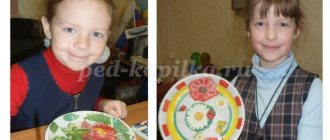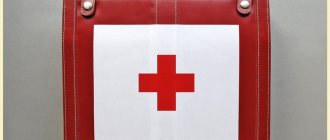MAGAZINE Preschooler.RF
“Designing a role-playing game “Pharmacy”Volokitina Natalya Anatolyevna Educator of the State Budgetary General Educational Institution “School No. 1383” Preschool Department No. 4
Preparatory group
1. Tasks:
- To develop in children the ability to independently develop the plot of the game “Pharmacy” ; promote independent creation and implementation of game plans
- Develop creative imagination, the ability to develop a game together, and continue to develop the ability to negotiate.
- Continue to teach how to perform various roles in accordance with the plot of the game, using attributes, encourage children to independently create items and parts (tools, equipment) that are missing for the game. Cultivate goodwill and willingness to help out a friend.
- To cultivate a sense of responsibility, friendliness, and respect for the profession of pharmacist and pharmacist.
2. Preparing for the game:
4. Progress of the game.
- The day before, the children, together with the teacher, make thermometers, blisters with tablets and capsules, make mustard plasters, recipes, receipts, ointments, and mixtures. As a result of production, interest arises in the beginning of the game.
- Children agree to play the game “Pharmacy” and determine roles. The teacher helps distribute roles, taking into account the wishes of the children. The teacher himself offers children the role of pharmacist, pharmacist, driver, and cleaner in order to increase the children’s activity. The teacher offers himself for the role of pharmacy manager. They discuss the plot. If necessary, the teacher asks clarifying questions:
— Who works in the pharmacy?
— Which child is suitable for the role of a pharmacist?
— Which child is suitable for the role of driver?
- What kind of work do they do?
The teacher helps children determine the most convenient place for play, equip it, lay out the necessary attributes, and select substitute items.
Children play independently:
One by one, clients enter the pharmacy.
- Hello!
— Please, your recipe.
— Sorry, but this drug is not available now. May I suggest you this one?
- Here is your medicine. Please note that it should only be taken after meals.
— Can I offer you some vitamins?
- I don’t like your condition? Are you feeling okay? Should I call an ambulance?
As the game progresses, the teacher reminds you that you need to be polite and courteous with pharmacy clients, talk quietly, because they may not feel well, and tell them in detail how to take the medicine.
3) The teacher participates in the children’s play when a new secondary role is introduced and when the plot of the game becomes more complex.
The teacher, as the head of the pharmacy, monitors the correctness of the game.
4) Techniques for maintaining and developing the plot of the game:
— Introduction of new game situations: Suddenly an unusual suitcase fell from the sky. The children became curious. Let's open it and see what's there? Children list the attributes of medical instruments and drugs (sterile wipes, bandages, syringes, tablets, mixtures, ointments, vitamins and much more) and in the suitcase there is a note with some request.
5) Techniques for forming relationships in the game:
The teacher reminds about relationships, encourages politeness (praise).
5. End of the game
“dialogue” procedure can be repeated 2-3 times. During the game, the teacher encourages the child to consistently change playing roles. At the end of the game, the teacher turns to the children and says that the pharmacy is closing because it is too late, but tomorrow the pharmacy workers will be glad to see you at their place, where you can make purchases. The teacher asks his students whether they liked the game, what new things they learned during the game, and finds out what new game actions they have mastered today.
6. Game evaluation
The teacher thanks the children for the interesting game, asks them if they liked the game, what they remember most. Clarifies why they were interested, correctly notes that each child played in accordance with his role. Invites children to express their opinions by asking each child what he thinks, whether he coped with his role. Separately notes and praises children who find it difficult to make contact. At the end of the game, the teacher asks the children how they can protect their health and what needs to be done for this. Children answer: do exercises, harden up, eat vegetables and fruits, play sports, walk in the fresh air, drink vitamins and take antiviral drugs.
The teacher wishes the children health and distributes delicious, healthy apples to everyone.
| Next > |
Summary of the role-playing game “Policlinic, pharmacy, family”
Summary of the role-playing game “Policlinic, pharmacy, family”
Goal: To develop children’s ability to divide into subgroups in accordance with the plot. To cultivate respect for the work of a housewife, doctor, pharmacist, receptionist, to expand the idea that the well-being of another person depends on the quality of one person’s work. Continue to teach children how children interact with each other.
Game actions: - coming to the clinic; — receiving a card at the reception; — appointment with a doctor; - prescribing medication; - buying medicine at the pharmacy.
Equipment: - doctor's gown, doctor's cap; - recipes; - patient card; - telephone; - cash register; - coins; - jars of medicine.
Game roles. Doctor, nurse, patient, receptionist, pharmacist, mom, dad, family members.
Progress of the game.
Part 1.
Educator: Today we will play the role-playing game “Polyclinic, Pharmacy, Family.” Think about what roles this game involves? Children: doctor, nurse, receptionist, pharmacist, mother, father, daughter, patients. Educator: What do these characters do? Children: The doctor treats patients. The doctor listens with a phonendoscope, checks the throat with a spatula, writes a prescription, and makes an entry in the medical record. The nurse collects patients' pre-appointment cards, tells them to wait in line, follows the doctor's instructions, invites patients into the office, or asks them to wait for an invitation. The patient takes his medical card from the reception desk, gives his address, gets in line to see the doctor, listens to the doctor, the nurse, tells the doctor about his health and fulfills the doctor’s prescription, goes to the pharmacy with a prescription and buys medicine. The registrar, at the request of the patient, issues a medical card. Mom cooks dinner, feeds her daughter, walks with her, puts her to bed, and visits the doctor. Dad helps mom with housework, prepares dinner, does laundry, washes dishes, plays with his daughter, tells fairy tales, visits the clinic, goes to the pharmacy to buy medicine. Educator: Think about where we will place the doctor’s office, where will the pharmacy be, where will our family live? Children: The family will live where the kitchen is; the clinic will be next to the closet where the building material is; the registration desk will be next to the doctor’s office on a table; the pharmacy will be on Elena Vasilievna’s distribution table. Educator: Whom will we choose as a doctor, what suggestions do we have? Children: I think that Polina Skibitskaya should be chosen as a doctor, because she treats patients politely and knows how to use the attributes of a doctor well: a phonendoscope, a spatula, a thermometer, and knows how to take notes. You can choose Katya Tolkacheva as a nurse, because she carries out all the doctor’s instructions: she invites patients into the office, asks them to wait for patients in the corridor in a polite voice, collects cards with a smile, and carefully places the thermometer. The registrar could be Zhora Akimov, he knows street names well, knows a lot of numbers, which means he can quickly find the right house number and know how to ask the patient’s address. Anton Komarov can be a pharmacist because he is well versed in prescriptions and quickly counts money and gives change correctly. I propose to be Sonya Bulygina’s mother, because she knows how to treat children well and correctly, she knows how to cook delicious soup, porridge, compote and feed them; she knows how to talk to her child, console him, sing a song, go with the child to the clinic. I propose to become a dad to Valentin, because he treats Sonya well and obeys her in everything, he will do everything that his wife asks him to do. Educator: The rest of the children can be patients and become family members - grandparents, brothers, sisters or friends - this is at everyone’s request. And now everyone, in accordance with their role, will prepare a playing place for themselves and begin the game, without waiting for my instructions. Children prepare their own play areas.
Part 2.
Progress of the game. Everyone performs their role in accordance with the agreement before the game. Family: prepares dinner, sets the table, feeds the child, eats themselves, puts the child to bed, washes the dishes, goes to the doctor, to the pharmacy, treats the child at home, goes to the doctor again. Mom: Valya, rock your daughter in the crib, and I’ll prepare breakfast. (Cooks porridge) Dad: bye, bye, bye, bye. (Rocks the crib) Mom: Everything is ready. Come here my daughter (takes the doll), now I’ll feed you, let’s blow on the porridge so that it cools down. (feeds the doll). Valya, sit down at the table. Dad: The porridge is delicious, thank you. Mom: My daughter and I will go to the clinic, and you wash the dishes and cook lunch. (puts the doll in the stroller and goes to the clinic) The registrar issues medical cards at the request of patients. Mom: Hello, I need a map, we live at Teply Stan, no. 2, apt. 10. Receptionist: Just a minute, I'll take a look now. (looks for a map). Is your last name Bulygina? Mom: Yes, my last name is Bulygina. Registrar: Take your card, go to the office. Mom: Thank you. The doctor sees patients in accordance with the agreement. The nurse carries out the doctor's instructions. Mom: Hello, can I come in? Doctor: Come in, sit down. What are you complaining about? Mom: My daughter has a bad appetite, she didn’t eat anything in the morning. Doctor: Katya, take the child’s temperature. Nurse: Mommy, give me your baby, I’ll put a thermometer on. (puts on a thermometer and measures the temperature) Nurse: Polina Igorevna, the temperature is high. Doctor: Let me look at the throat (takes a spatula and looks at the throat), the throat is red, so the child does not eat well, she has a sore throat, I will prescribe injections, the nurse will come to your home and give injections at home, and you will buy the necessary medicines and give the girl powders and warm milk. Mom: of course, I will do everything as you say. Doctor: In a week, come to the appointment at the same time, take the prescription. Goodbye. Mom: Goodbye (takes the prescription and leaves). The pharmacist reads the prescriptions and selects the medicine, takes the money and gives the change. Mom: Hello, do you have any powders? Pharmacist: (looks at the recipe) We have powders, they cost two rubles. Mom: Here, take it. (hands out the money and takes the medicine). Pharmacist: Take one powder every hour. Mom: Thank you and goodbye. Pharmacist: Goodbye. Mom: Valya, our daughter has a sore throat, when her throat hurts, we were prescribed powders and injections, the nurse will come and administer them at home. Nurse: Ding-ding-ding. Hello, I came to give your daughter an injection. Mom: please come in. Nurse: (takes out a syringe from her suitcase and gives an injection) That’s all, I’ll come back tomorrow, goodbye. Mom: I came to the doctor for an appointment, please give me the card. Registrar: Give your name and address. Mom: Teply Stan, 2, apt. 10. Bulygin. Registrar: Please take it (holds out card). Mom: Hello doctor, hello Ekaterina Dmitrievna, a week has already passed, my daughter has recovered. Doctor: Let's see now. Tell me, I'll look at your neck. (the doctor looks) You’re right, my daughter is healthy, you can go. Goodbye. Mom: Thank you, goodbye. The game ends with the teacher announcing that the day is coming to an end, all institutions: schools, kindergartens, clinics, pharmacies are finishing their work, all the kids are going to bed and the adults are tired of the day and also lie down to rest.
3rd part.
Educator: My students will come up to me and tell me who they were and what they liked most.
Children talk about their impressions. The teacher analyzes the game of each character, noting especially successful moments of the game associated with the dialogue or monologue of the players, with professional actions in the game. He reports that next time they will play a game called “Family, Shop, Clinic, Pharmacy.” Author: Ermakova Marina Vladimirovna


